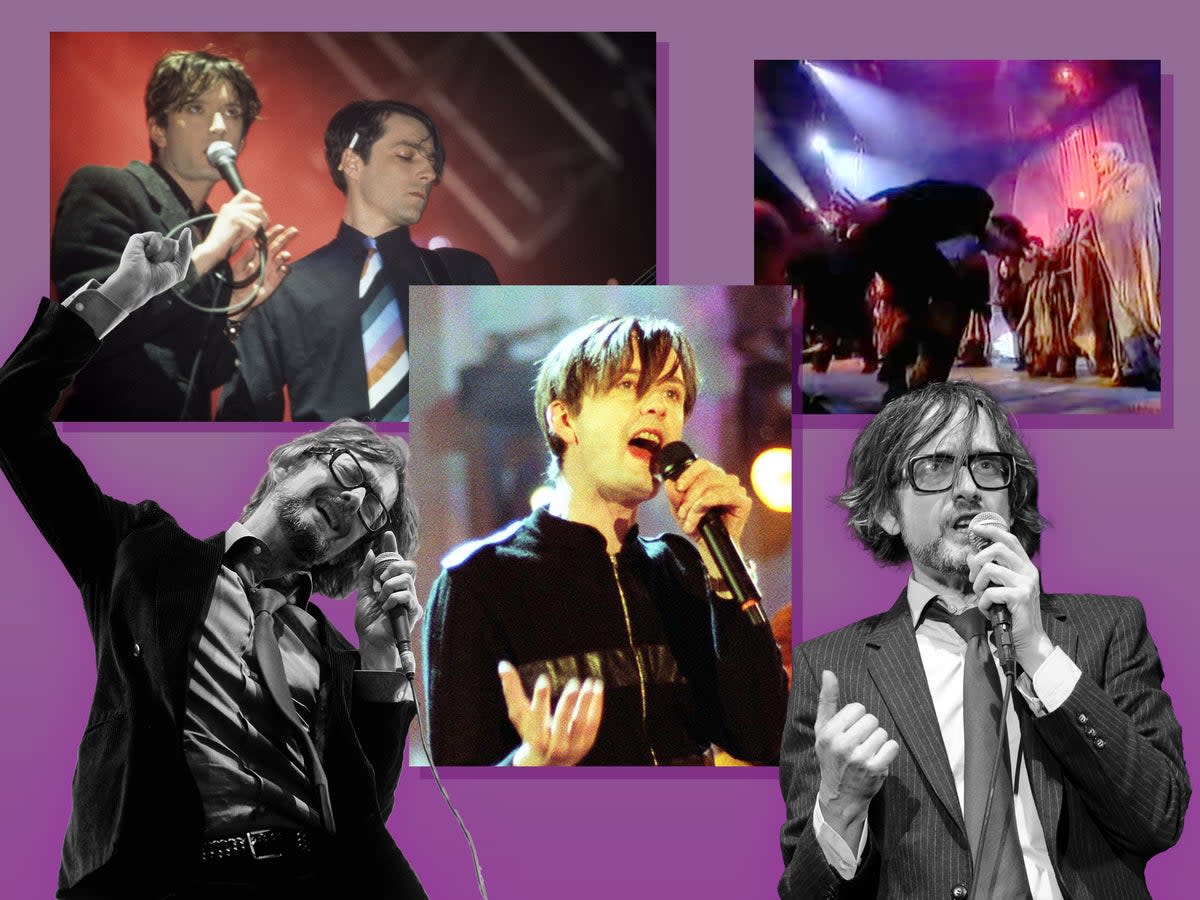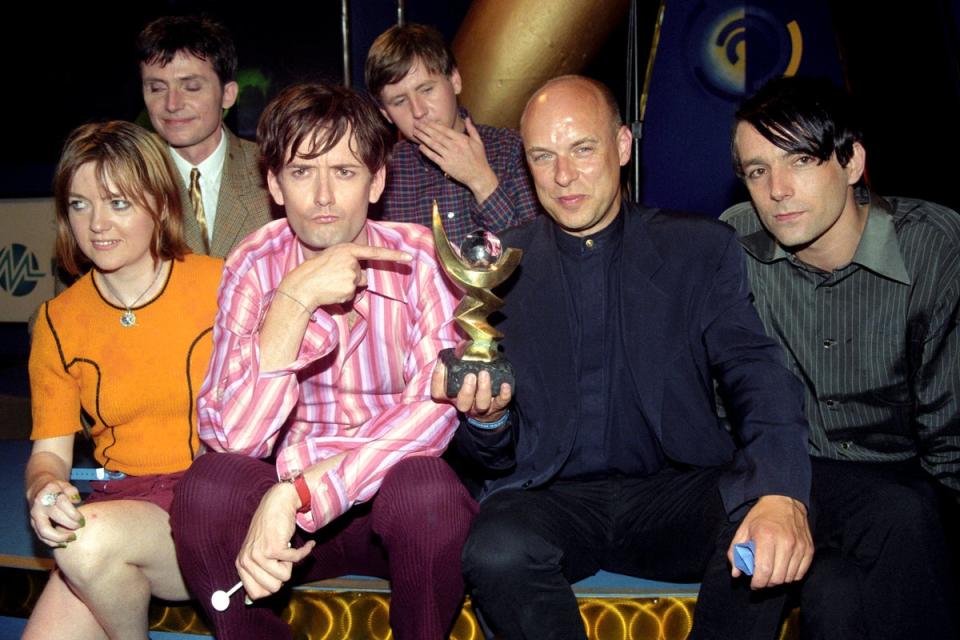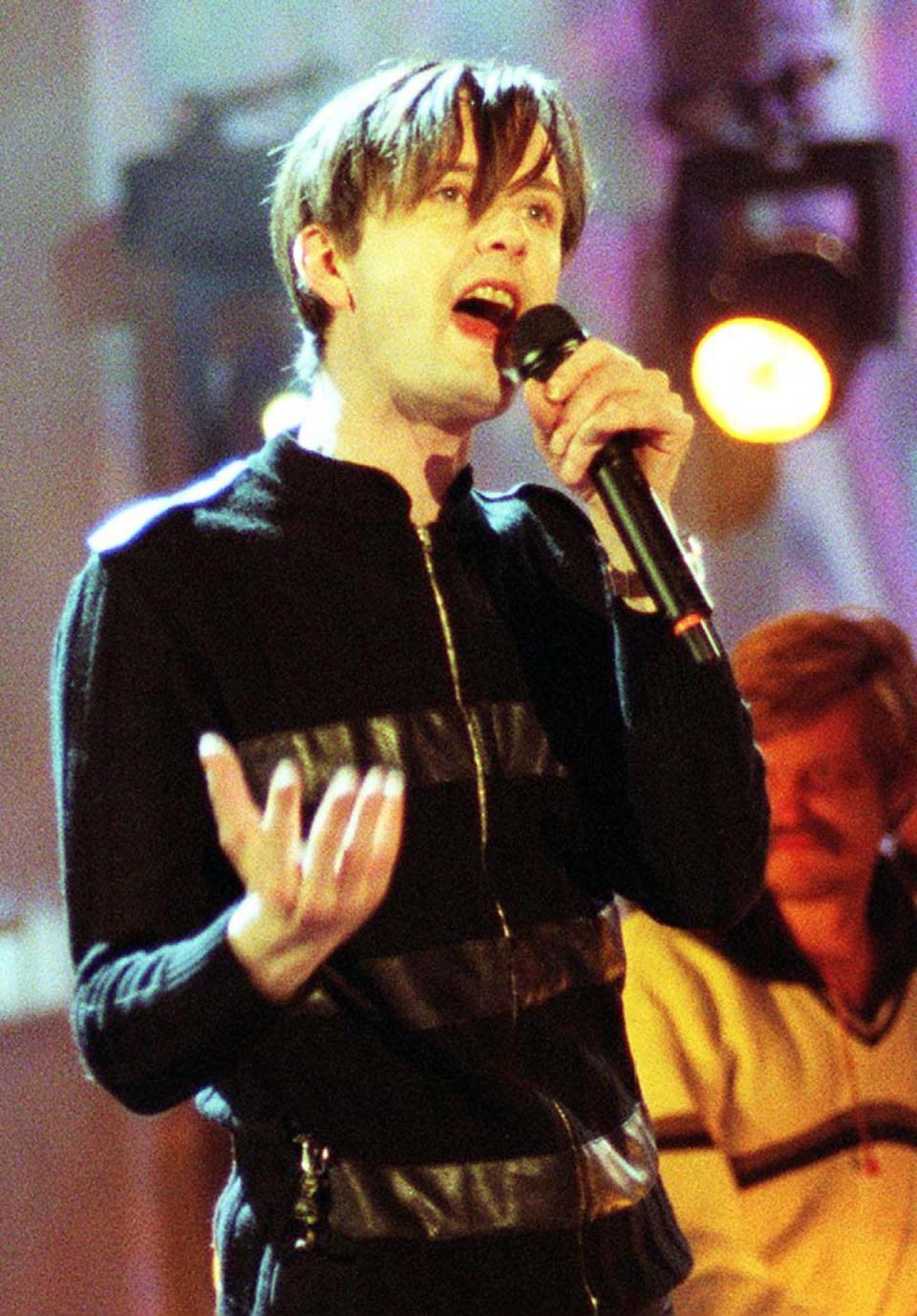‘Like James Bond playing strip poker in a sex dungeon’: Pulp’s This is Hardcore at 25

When you’ve stolen Glastonbury, defined an era, released the album of the decade and exploded Michael Jackson’s cheesy pop pomposity on the global stage, what exactly do you do for an encore? Such was the dilemma facing Jarvis Cocker – arch Britpop voyeur, poet laureate of the fumbled bra-strap and Jesus sandal, once memorably described as a cross between Alan Bennett and Barry White – as he sat in hotel rooms on the tour for 1995’s masterpiece Different Class. There he was, shrouded in the anonymous dark, watching pornographic films and relating deeply to the blankness in the eyes of the performers.
“I found it fascinating wondering what happened to these porn stars,” the frontman of Sheffield alt-legends Pulp – who reform for a run of major festival and arena shows this summer – told NME in 1998. “People have a voracious appetite for porn, they need to see new faces all the time, so what happens to the older people when they've been used up and had everything done to them?” In the wake of the intense tabloid attention that had followed his invasion of the Brits '96 stage to waggle his backside at Jacko during a messianic performance of “Earth Song”, he himself had begun to feel like so much past-its-sell-by meat. He saw, in all the fake groans and emotionless pounding, a mirror on showbiz’s ever-churning conveyor belt of celebrity. “It seemed to strike a chord with me. I wondered about the people and whether there's any way back into normal life for them.”
The result of Cocker’s extensive post-gig “research” was 1998’s This Is Hardcore. Released 25 years ago this week, Pulp’s sixth album is among rock’s most elegant and anguished career suicides. The album shone an unforgiving black light into the darkest crannies of the late-Nineties experience. “Party Hard” was both a homage to Bowie’s Station to Station era and a satire of the desperate, compulsive hedonism that had devoured the Britpop scene. “The Fear”, “the sound of loneliness turned up to 10”, crawled inside the subsequent drug comedown – detailing the paranoia, psychosis and panic attacks that ensue when “the monkey’s built a house on your back” – and curled up in a grisly, bombastic ball. “Glory Days” raised a weary glass to the century’s final wind, burnt out before disco 2000 could even kick off. And there, at the heart of it all, was the Viagra’d lothario of “Help the Aged”, still trying his luck at a ripe old age but only too aware of life ticking inexorably away.
It was a record of broken cynicism and despairing excess, encapsulated by the sleazy extravagance of the title track. Sounding like James Bond playing strip poker in a sex dungeon, “This is Hardcore” wove an explicitly pornographic metaphor for fleeting fame around a lecherous pulp noir horn refrain sampled from The Peter Thomas Sound Orchestra’s “Bolero on the Moon Rocks”. Cocker’s disgust at both formulaic film sex and music industry exploitation dripped from every weary word. “That goes in there, then that goes in there, and then it’s over”.
Blur had already conceded to grunge on 1997’s Blur and Radiohead had pulled the plug on the Nineties disco ball with OK Computer. Now, coming from these doyens of the neon dancefloor who were behind many of the most wry but ebullient hits of the decade – “Common People”, “Razzmatazz”, “Babies”, “Disco 2000” – it’s no wonder that This is Hardcore was received as Britpop’s final nail. Yet it also stands as the scene’s dramatic closing act and opulent curtain call, its reputation outstripping its chart-topping if modest-for-the-time sales. If Britpop ever strove for the grandeur of Scott Walker, the menace of mid-period Bowie and the import of The Velvet Underground, it was here.
Of the record’s numerous telling lines, one particularly stands out in retrospect. “I can’t believe it took me this long,” Cocker wailed at the (ahem) climax of the title track, hinting at the 20 years it had taken Pulp to build the success they were now putting entirely on red.
Aged just 15, Sheffield outcast Cocker, famously once sent to school by his mother in lederhosen, had formed the band in 1978 with schoolmate Peter Dalton, and by the time they began playing gigs two years later they slotted awkwardly into the post-punk art-pop underground alongside The Fall and the Human League.
Early independent albums It (1983) and Freaks (1987) were oddball, sometimes cranky affairs that seemed designed to fend off popular appeal. Cocker’s onstage exuberance, meanwhile, was restrained somewhat by the months he spent performing in a wheelchair, having fallen out of a window at a party while pretending to be Spider-Man to impress a girl.
The band crashed in Sheffield but were rebooted in London. Having effectively folded Pulp to move to the capital to study film at Central Saint Martins College of Art and Design, Cocker ran into Yorkshire gig regular and heartthrob bassist Steve Mackey and reformed the band with its key line-up – Cocker, Mackey, keyboardist Candida Doyle, guitarist and violinist Russell Senior and drummer Nick Banks (guitarist and ex-Pulp fan club president Mark Webber would join in 1995). After 14 years, Pulp were finally in the right place at the right time; their infectious 1992 synthpop single “OU” emerged around the same time as Blur’s brassy “Popscene” and Suede’s delectable debut “The Drowners”. Between them they marked a bright, distinct cultural break from the bleary-eyed scenes that had been dominating alternative music: namely grunge, baggy and shoegaze. Britpop was go.
A torrent of indie dancefloor mainstays such as “Do You Remember the First Time?”, “Babies” and “Lipgloss”, 1994’s top 10 His ‘n’ Hers album cemented Pulp’s place among this new era’s Big Four: Blur, Pulp, Suede and Oasis. And while the nation was distracted by the Blur vs Oasis singles chart bunfight in 1995, Pulp surreptitiously snuck in and stole the decade when they stepped in to headline Glastonbury in place of The Stone Roses, premiering a none-more-pertinent new folk-pop song called “Sorted for E’s and Wizz”, about leaving an important part of your drug-torpedoed brain in a festival field, and making “Common People” a bona fide generational anthem.

The subsequent album Different Class, arguably the greatest of the Nineties, hit No 1, bagged the Mercury Prize and set Pulp on course to launch their own two-site festival, which became V96. By then, Cocker could only wander the site unbothered by dressing up in a gorilla costume. With his quick wit, affectionately conversational crowd banter and striking way with an angular pose and lascivious finger flick, he was swiftly adopted as a national treasure and chat show favourite, a must-have name on any mid-Nineties guest list.
But it was getting arrested for his now legendary stage invasion at the Brits in 1996, flapping the back of his blazer from the side of the stage to indicate the pomposity of Michael Jackson’s performance, which tipped his celebrity over the edge into gossip-page ubiquity and ex-girlfriend kiss-and-tells. “I remember waking up the next morning and it was like that thing when you've done something embarrassing the night before,” Cocker told The Face. “It was the same kind of feeling, except that it wasn't just my embarrassment, everybody else knew it had happened as well. It's like suddenly turning into Mickey Mouse. It didn't go away.”
I remember waking up the next morning and it was like that thing when you’ve done something embarrassing the night before
Jarvis Cocker on invading the stage during Michael Jackson’s performance at the Brits
“[He] captured the mood of the nation,” Mackey added. “I felt quite proud that he was still willing to stick his arse out in front of people and not give a s*** what they thought…he wasn't playing the pop star game.” According to Mackey, though, Cocker himself came to regret the incident. “It just led to him being followed around by people with long lenses for six months and appearing in the tabloids.”
Cocker told The Daily Telegraph that the experience was “like watching a film, seeing what’s on the screen and then suddenly being inside it, being part of the film”, only to find that “it’s better to be in the audience”. In Select magazine, he likened fame to Roger Moore’s 1970 Jekyll and Hyde reworking The Man Who Haunted Himself: “You’ve got another version of yourself out there, and people know that one better than they know you.”
Success proved dislocating for Cocker. He had more money than he’d ever had before but, as he told NME: “Whether it’s made me any happier is a moot point…It’s like when you see stuff about Lottery winners having to go through psychiatric therapy to deal with it.” He dived headfirst into the celebrity world of parties and TV appearances just to test the waters, but felt uncomfortable sharing vol-au-vents with daytime TV stars, or being asked to sell out 15 years of underground respect for an advert or a five grand guest spot on Noel’s House Party. He felt himself becoming a caricature of himself as indie’s opinionated Yorkshire raconteur and found himself, as a moneyed pop star, no longer able to maintain his role as the voice of the common people. “You don’t want to come up with some kind of pale imitation of yourself,” he said, “because you think you should keep writing about underpants and nylon fabrics.”
Recording for This is Hardcore began in November 1996. Within weeks, it soon stalled as Senior left the band claiming he felt it was no longer “cool” to be in Pulp. Cocker, meanwhile, disappeared to New York for three weeks plagued by a bout of writer’s block which some later classed as a minor breakdown. “It was to get away from everything, and to have a think about what I wanted to do next, or even if I wanted to continue doing it anymore,” he told Select. “There were some hairy moments there. You have to go through a crisis point, I think. I thought I'd go away and do it in private.” His absence, plus “The Fear”, stoked scurrilous rumours that Cocker was addicted to hard drugs. “I hope l'm not,” he told NME. “I haven't been in rehab… lt's too expensive and l'm too mean.”

Crisis averted, Pulp spent a year putting together This is Hardcore, ditching several obvious hit singles in favour of more opulent, bleaker pieces and canning songs that weren’t working for two months at a time, a previously unheard-of practice in Pulp world. The perfectionism paid off, if not in commercial terms – though it also reached No 1, …Hardcore sold significantly fewer copies than Different Class – then in artistic respect. “Desperation never sounded quite so entertaining,” wrote Rolling Stone. “Though the album is less instant, and less instantly classic, than Different Class,” wrote The Independent’s Andy Gill, “its increased depth pays extra dividends.” As Britpop became a post-Oasis trudge to the death in the late Nineties, Pulp (and Blur, with Blur and 13) transcended the scene, pointing to greater levels of innovation and largesse than many had thought possible of this one-time Camden knees-up of a movement.
Ultimately, Pulp would make only one more album, 2001’s pastoral We Love Life, produced by Scott Walker. But as they return for their second live reunion this summer (sadly minus Mackey who died earlier this month), it’s This is Hardcore above even their more titanic pop achievements, which bedrocks their standing as Nineties sonic giants. Wherever you catch them, it’s gonna be one hell of a night.


